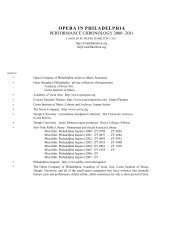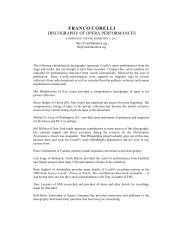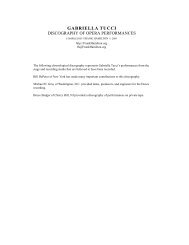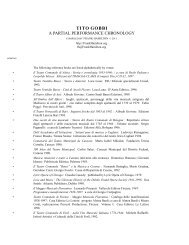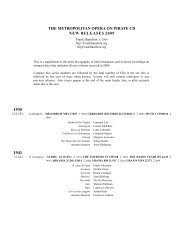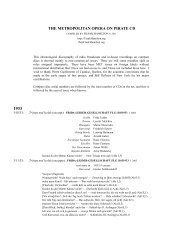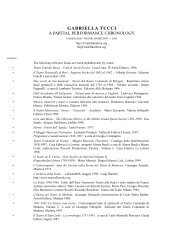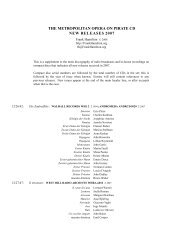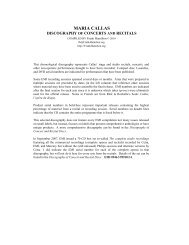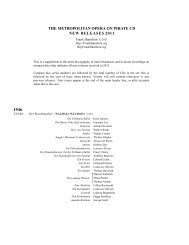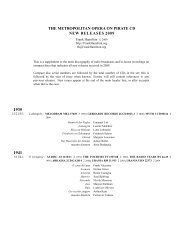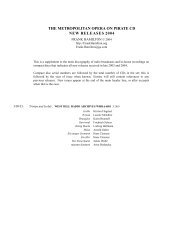Maria Callas · Discography of Concert and Recital ... - Frank Hamilton
Maria Callas · Discography of Concert and Recital ... - Frank Hamilton
Maria Callas · Discography of Concert and Recital ... - Frank Hamilton
Create successful ePaper yourself
Turn your PDF publications into a flip-book with our unique Google optimized e-Paper software.
• Setting roles in different periods<br />
• Visconti’s view <strong>of</strong> Iphigénie<br />
• <strong>Callas</strong> unhappy about the period used for La Scala’s Fedora<br />
• Movement in Tr aviata<br />
• Did Verdi conceive the Prelude to Tr aviata as the start <strong>of</strong> a flashback<br />
• Need for beautiful costumes in static operas<br />
• The importance <strong>of</strong> having vision in opera<br />
• The difference <strong>of</strong> opera in the nineteenth century <strong>and</strong> in this century<br />
Cannot modernize opera too much, but the repetition should be cut<br />
Interpreting old operas in a modern world<br />
A repetition must be justified by something, or it must be cut or changed<br />
Conductors prepare cuts before rehearsals begin<br />
Never sing a cabaletta twice, ‘‘never risk it twice’’<br />
Audiences are different today than one-hundred years ago<br />
• Opera in films, opera <strong>and</strong> Television, opera <strong>and</strong> the gramophone<br />
Young people today are afraid <strong>of</strong> romanticism, sentimentalism,<br />
<strong>and</strong> things old fashioned<br />
Is opera dead, how can we revive it?<br />
• During the early Italian career, conductors were also the directors<br />
Composers today <strong>and</strong> the public<br />
Everything moves too quickly, conductors no longer teach today<br />
• Choice <strong>of</strong> roles in the career, starting with heavy roles<br />
• Wagner’s effect on the voice, appreciation <strong>of</strong> Wagner<br />
• The challenge <strong>of</strong> Norma<br />
Preparing the role <strong>of</strong> Norma; Norma’s character; interpretation<br />
Part III, Second programme:<br />
Most <strong>of</strong> the unpublished portions <strong>of</strong> the second programme have been lost, so the<br />
third CD renders the edited final version <strong>of</strong> the BBC broadcast unchanged (repeating<br />
some <strong>of</strong> Part II).<br />
• Choice <strong>of</strong> roles in the career; starting with heavy roles<br />
• Wagner’s effect on the voice; apprecitation <strong>of</strong> Wagner<br />
• Movement training came principally from Elvira de Hidalgo<br />
• Preparing the role <strong>of</strong> Norma; Norma’s character; interpretation<br />
The different voices <strong>of</strong> Norma; one must sing best in the last act<br />
• Breathing in bel canto; "one must always sing in the center <strong>of</strong> a note"<br />
• Norma <strong>and</strong> Violetta are both noble roles, similarity <strong>of</strong> roles<br />
• Big voices in Mozart <strong>and</strong> Verdi<br />
• Setting operas like Tr aviata in different periods<br />
Did Verdi conceive the Prelude to Tr aviata as start <strong>of</strong> a flashback<br />
Interpretation <strong>of</strong> Violetta; Visconti <strong>and</strong> Serafin<br />
Finding the appropriate vocal color for a role<br />
• Harewood comments on the number scores in her bookcase<br />
• Interpretation <strong>of</strong> Carmen<br />
Bizet’s opera <strong>and</strong> Mérimée’s novel<br />
Carmen’s nature goes against <strong>Callas</strong>’ principals<br />
• Interpretation <strong>of</strong> Tosca <strong>and</strong> Tosca’s character<br />
Bringing roles from the ‘‘soul <strong>and</strong> mind’’ <strong>and</strong> giving to the public<br />
8



